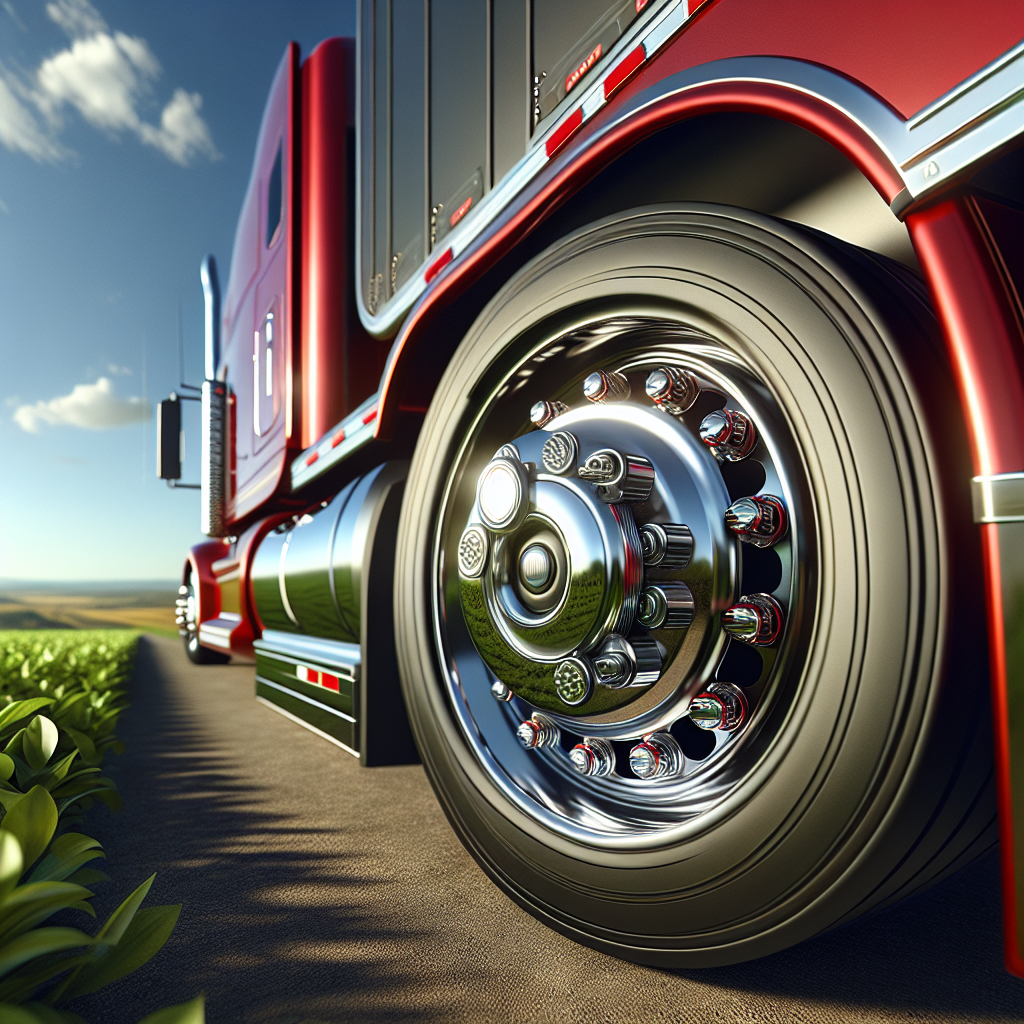In the world of trailer management, the introduction of Tire Pressure Monitoring Systems (TPMS) has revolutionized safety and efficiency. These advanced systems are essential for ensuring that your trailer remains in optimal condition during transit. A reliable TPMS provides real-time data on tire pressure and temperature, which is critical for preventing tire blowouts and other failures that could lead to catastrophic incidents.
Understanding the importance of TPMS for trailers cannot be overstated. By continuously monitoring tire health, these systems help maintain proper inflation levels, thereby enhancing fuel efficiency and prolonging tire life. Additionally, many TPMS units can alert you to abnormal conditions before they escalate, giving you the opportunity to address issues proactively. This means fewer delays and a safer journey.
Moreover, a smart trailer equipped with TPMS can provide invaluable data for fleet managers, helping them make informed decisions regarding maintenance and operational efficiency. By reducing the risk of tire-related breakdowns, TPMS contributes significantly to road safety and operational reliability.
Tow with peace of mind, knowing that trailerwatchdog is standing guard.
Key Features to Look for in TPMS Systems

When selecting the best TPMS for trailers, it's crucial to consider various key features that will enhance your monitoring experience and ensure maximum safety. Here are some of the essential features to look for:
- Real-Time Monitoring: A quality TPMS provides continuous real-time data on tire pressure and temperature, allowing you to react swiftly to any irregularities.
- Alerts and Notifications: Look for systems that send alerts directly to your smartphone or onboard display when tire pressure falls outside the recommended range. Early warnings can prevent potential hazards.
- Wireless Connectivity: Opt for TPMS that uses wireless sensors to transmit data. This feature simplifies installation and minimizes maintenance concerns.
- Multiple Tire Monitoring: If you have a multi-axle trailer, choose a TPMS that can monitor all tires simultaneously, ensuring comprehensive coverage and safety.
- Durability and Weather Resistance: Given the harsh conditions trailers often face, it’s important to select a system designed to withstand extreme temperatures, moisture, and dust.
- Battery Life: A long battery life for sensors reduces the frequency of replacements and ensures uninterrupted monitoring.
- Data Logging: Some advanced systems offer data logging features, allowing you to review historical tire performance data. This can help identify patterns and predict maintenance needs.
By focusing on these key features, you can make an informed decision that enhances your trailer's safety and performance on the road.
Top Recommended TPMS for Trailers in 2023
As the demand for reliable trailer monitoring systems grows, several TPMS options have emerged as top contenders in 2023. Here are some of the best TPMS for trailers worth considering:
- PressurePro TPMS: Known for its accuracy and reliability, PressurePro offers a robust solution with real-time monitoring and customizable alerts. Its user-friendly interface and durable sensors make it a popular choice among trailer owners.
- TireMinder Smart TPMS: TireMinder provides excellent wireless functionality with a smartphone app for remote monitoring. Its long battery life and weather-resistant sensors ensure consistent performance, making it suitable for various trailer types.
- eTrailer TPMS: This system stands out for its simplicity and effectiveness. With a clear display and easy installation, eTrailer offers real-time pressure readings and alerts, ensuring you stay informed while on the road.
- EZ Tire TPMS: EZ Tire is designed for those who prioritize ease of use. It features a straightforward setup process and provides timely notifications about tire conditions, along with a long-lasting battery for its sensors.
- Schrader TPMS: Schrader is a well-established brand that offers commercial-grade options. Its advanced features include multiple tire monitoring and data logging, making it ideal for serious trailer operators.
Each of these systems brings unique features and benefits, catering to various needs. By selecting one of these recommended TPMS options, you can enhance your trailer's safety and performance significantly.
Benefits of Using a TPMS for Your Trailer

Investing in a TPMS (Tire Pressure Monitoring System) for your trailer comes with a multitude of benefits that enhance both safety and efficiency on the road. Here are some key advantages:
- Enhanced Safety: One of the primary benefits of using a TPMS is the significant increase in safety. By providing real-time tire pressure and temperature data, a TPMS helps prevent blowouts and accidents caused by under-inflated or over-heated tires.
- Improved Fuel Efficiency: Properly inflated tires contribute to better fuel economy. A TPMS ensures that your tires are always at the optimal pressure, which can lead to reduced fuel consumption and lower operating costs.
- Extended Tire Life: Maintaining the correct tire pressure extends the lifespan of your tires. A TPMS alerts you to any pressure issues, allowing you to address them proactively and avoid premature tire wear.
- Real-Time Monitoring: With a TPMS, you gain access to real-time data about your trailer's tires. This immediate feedback allows you to make informed decisions and take action before minor issues escalate into major problems.
- Increased Peace of Mind: Knowing that your trailer is equipped with a reliable monitoring system provides peace of mind while traveling. You can focus on your journey, confident that your tires are being monitored for safety and performance.
These benefits highlight why integrating a TPMS into your trailer setup is a wise investment. It not only enhances safety but also improves overall efficiency, making your travels smoother and more secure.
How to Install and Maintain Your TPMS

Installing and maintaining your TPMS (Tire Pressure Monitoring System) is crucial for ensuring its effectiveness and longevity. Here’s a step-by-step guide to help you through the process:
Installation Steps
- Choose the Right TPMS: Begin by selecting a TPMS that suits your trailer's specifications. Consider factors such as the number of axles and tire sizes.
- Gather Tools: Common tools needed include a wrench, screwdriver, and possibly an air compressor to adjust tire pressure.
- Install Sensors: Most TPMS units come with sensors that attach to the valve stems of your trailer's tires. Follow the manufacturer’s instructions for secure attachment.
- Connect the Monitor: After installing the sensors, connect the monitor to your vehicle or trailer. Many systems have wireless capabilities for ease of use.
- Calibrate the System: Once everything is installed, calibrate the TPMS according to the manufacturer’s guidelines. This step ensures accurate readings.
Maintenance Tips
- Regularly Check Battery Levels: Many TPMS units operate on batteries that need periodic replacement. Regular checks can prevent system failures.
- Inspect Sensors: Look for any signs of wear or damage on the sensors. Ensure they are clean and free from dirt or debris that could impair function.
- Monitor Tire Pressure Consistently: Regularly check the readings on your TPMS monitor, especially before long trips, to ensure everything is functioning correctly.
- Update Software: If your TPMS has software updates available, make sure to install them to benefit from new features and improvements.
By following these installation and maintenance steps, you can ensure that your TPMS operates effectively, helping to keep your trailer safe and efficient on the road.
Conclusion: Choosing the Best TPMS for Your Trailer

In conclusion, selecting the best TPMS for your trailer is essential for enhancing safety and preventing potential failures during your journeys. With a variety of options available on the market, it’s important to consider the specific needs of your trailer and your towing habits. Look for features such as:
- Real-time Monitoring: Ensure that the TPMS provides live updates on tire pressure and temperature.
- Durability: Choose a system that is designed to withstand the rigors of towing, including exposure to the elements.
- Ease of Installation: A user-friendly setup will save you time and ensure that your system is functional when you need it.
- Alerts and Notifications: Opt for models that send alerts directly to your smartphone or vehicle dashboard, allowing for quick responses to any issues.
By thoroughly researching and evaluating your options, you can make an informed decision that best suits your requirements. Remember, investing in a reliable TPMS not only protects your trailer but also enhances your overall towing experience.
Tow with peace of mind, knowing that trailerwatchdog is standing guard.








